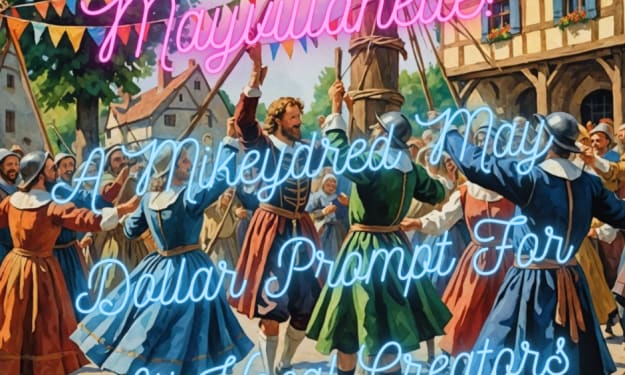What Are Neologisms?
And what do they say about humanity?

One of the many things I like about writing on Vocal is that it urges me to write. Each week or month comes with a fresh set of challenges, which serve as a nice amuse bouche for this writer’s palate which can be prone to writer’s block. ‘Neolomicro’ is a particularly fun one, again offering small bites of inspiration for an easily distracted mind.
As much as I love longer form writing, I find myself drawn to haiku, poetry, and the microfiction challenges, in part because I am given a limitation. And that is somehow freeing. The free reign to invent a new word, too? Color me intrigued.
In the digital age, we’re witness to language evolution in real-time, as new words—neologisms—bubble up from the cauldron of our society. Experts debate whether it emerged from a single ingenious spark or evolved gradually from our ancestors' primal communications.
The theories of language origin range from the divine to the mundane. Some suggest a 'big bang' of cognitive change, while others argue for a slow, adaptive process that edged us from cries and howls to syntax and semantics. The first words likely emerged out of necessity—naming crucial things like food, danger, and family. Think Maslow’s hierarchy of needs, below: Is it necessary for survival? We should probably have a word for it. Which is why I added 'Internet'. I didn't invent it, but someone did. Why? Necessity.

Picture a prehistoric human pointing at a mammoth and uttering a sound that would come to signify the giant beast—this was the dawn of reference, the cornerstone of language. But language didn’t just describe reality; it began to shape it, allowing humans to share knowledge, forge communities, and build the very foundations of civilization.
What are Neologisms?
The lifeblood of language is its ability to grow, to stretch itself to encapsulate new concepts, technologies, and experiences. A neologism is a newly coined word or expression--the linguistic answer to an unvoiced concept, a verbal key to open doors to new ideas or phenomena. New words can be born from a flash of insight or a fumbled utterance, a poet's pen or a scientist’s rigor. They take root in the fertile ground of necessity—be it to name an invention or to express a shared feeling in the collective human experience.
Like any living thing, neologisms have life cycles. Some sparkle briefly and fade, while others entrench themselves in our dictionaries and dialogs. Consider "google" as a verb—it transitioned from brand name to a universal action in less than a generation. Why? Necessity. Because let’s face it—are you going to dust off the old encyclopedias to look something up? Do you even have one, did you ever? At the risk of aging myself, let’s continue…
How Do Words and Society Intersect?
Our language quite literally speaks volumes about humanity and what is important to a culture. The words we use serve as mile markers for future generations to understand what mattered to us, what we created, and what changed us, and for those living now to breathe life into what is valuable to us.
The etymological mirror of society shows us that language morphs hand-in-hand with innovation and cultural evolution. New technologies, societal trends, and pivotal moments necessitate fresh vocabulary; words like "telegraphy" and "broadcast" emerged from technological progress, encapsulating new actions and ideas brought about by inventions.
Cultural shifts often necessitate new terms, as they reflect changing attitudes, practices, and societal norms. Words like "woke" and "cancel culture" have been coined in the crucible of social change, highlighting evolving consciousness around social justice and accountability, for example. Like them or hate them, they are most likely here to stay, if for nothing else than to feed the insatiable appetite that is the Internet.
Historical neologisms also offer us a lens into the past. Consider the word "suffragette," born from a movement that reshaped society's views on gender and voting rights. Or "jazz," which encapsulates a musical revolution with deep cultural and social implications.
In today's fast-paced techno-landscape, the creation and dissemination of new words have accelerated. The Internet acts both as a breeding ground for neologisms and a catalyst for their viral spread. It is the interaction, the feedback loop between users and creators that spawns terms such as "binge-watch” and “viral” reflect new habits and the power of networked connectivity.
But the introduction of new words does more than expand the dictionary; it can alter perception and behavior. Language doesn't just capture reality; it shapes it. Cognitive linguists argue that language influences thought—introducing a word like "mansplaining" not only names a behavior but also brings attention to it, potentially altering social dynamics.
The adaptability of language speaks to the flexibility of human cognition. As we encounter new realities—virtual reality, climate change, social media phenomena—our language expands to encompass them, demonstrating an incredible capacity for linguistic and conceptual growth.
The evolution of language sometimes faces resistance. Linguistic purists may bemoan the corruption of language, yet the natural progression of speech has always outpaced such concerns. The debate between linguistic purism and evolution is ongoing, highlighting the tension between tradition and innovation.
Neologisms are not merely linguistic fads but reflections of our times, mirroring our technologies, our politics, our fears, and our joys. They crystallize moments of collective consciousness, capture the zeitgeist, and sometimes, they even shake the foundations of our beliefs.
To embrace the dynamism of language is to embrace change itself. It is to recognize the power of human communication and its capacity to evolve with us, reflecting who we are and who we aspire to be. As we navigate an ever-complex world, the words we coin today will carry our stories, our innovations, our identities, and our very humanity into the future.
What words have you created? Share in the comments!
I’ve got a few you may enjoy I’ll link below, and look forward to reading yours!
About the Creator
E.K. Daniels
Writer, watercolorist, and regular at the restaurant at the end of the universe. Twitter @inkladen
Reader insights
Outstanding
Excellent work. Looking forward to reading more!
Top insights
Easy to read and follow
Well-structured & engaging content
Expert insights and opinions
Arguments were carefully researched and presented
Eye opening
Niche topic & fresh perspectives
Heartfelt and relatable
The story invoked strong personal emotions
Masterful proofreading
Zero grammar & spelling mistakes
On-point and relevant
Writing reflected the title & theme







Comments (7)
Such a brilliantly written & analytical article E.K. Congrats on this excellent piece and your top story! I liked your insights into “woke” and “cancel culture and how the internet feeds off of these. I also love this idea that “Language doesn't just capture reality; it shapes it”. Indeed!! ☺️👏👏👏
Amazing interpretation! I felt I learned a lot from this and see why it became a top story! It truly is worthy of a Wikipedia (which is a fairly new word, lol) definition entry. Well done, indeed! I did 5 or 6 new words for the challenge, most of which were for fun but a couple were serious, like ectophile and muddelex. If you have time you can find them in my profile. Congrats again!
An interesting discussion, sociolinguists is so fascinating and I love how language reflects an age. Congrats top story!
This was an interesting discussion of language. I've always seen it as a flux, constantly moving and changing. It concerns me sometimes the way that we, as a people, dumb down to express ourselves - emojis and acronyms because the nuance of individual words gets lost and I love the process of picking the right word to describe something : one that hits the proverbial nail directly on the head. I worry that we are moving away from that into territory where we limit ourselves, taking away the flavour of language by limiting our interaction with it and as a result, restricting ourselves. Language as a tool to control maybe? I don't know. Either way, your article got me thinking and that is no bad thing! Congrats on TS!
This is wonderful. Congrats on the TS.
Uplifting & inspiring m, love it!!!💕❤️❤️ Congratulations on Top Story!!!
your story makes me want to work even harder. Thank you for the encouragement.